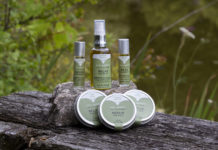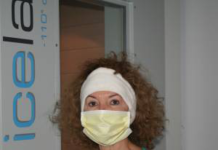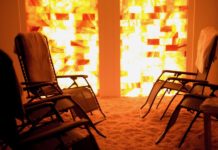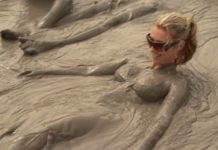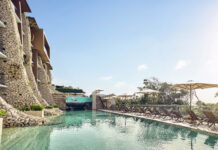
Hot and cold water therapies. Some people may think it’s a new wellness trend but actually the holistic treatment has been around since the early 1800s and we have Dr. Kneipp tho thank for it. Story by Roberta Sotonoff
Most people think of clergy as people who save souls. Well, Sebastian Kneipp, a Catholic priest (1821-1897) did that but he saved bodies, too. Using a bucket, he started giving his colleagues treatments in his home and in his garden. Many of his therapeutic tubs remain in the old bath house in the Bavarian village of Bad Woerishofen (pronounced bod weer-is-hoe-fan).
Kniepp discovered this treatment when, as a young man, he suffered from tuberculosis. After reading a book about using water to treat illness, he began immersing himself in the chilly Danube River. He claimed it healed his TB.
From water experiments and his study of agriculture, Kneipp developed a ‘cure’ said to help, among other things, arthritis, breathing, digestion and insomnia. His program consists of The Five Pillars -hydrotherapy, exercise, nutrition, phytotherapy (the use of plants or plant extracts for medicinal purposes) and lifestyle management. He believed if stress management could be attained, it would lead to physical well-being, the zest for life and a oneness of body and soul. For this, things like prayer, meditation and relaxation are recommended.
There must be merit in Kneipp’s treatment because over a century later, these holistic practices thrive. Over 120,000 people come each year to take the ‘cure.’ They keep Bad Woerishofen’s 15,000 residents hopping.
Every hotel along with the Sabastianum (a full-scale treatment facility)offer therapies. At the Kneippianum, you get the whole nine yards – treatments, lodging, food cooked the Kneipp way—low calorie, low salt, low cholesterol- and a church for prayer. Lenten Time, a special Kneippianum regimen, is continuously supervised by a doctor and includes a cleansing diet.
No matter where you stay, the first stop of any program is to visit with a doctor. He organizes your individual program, often combining some of the Five Pillars.
So what is a Kneipp day like? Mine begins early in the morning when a therapist comes to my room to administer a Haysack Treatment. The therapy, which can be a warm or cold, resembles two really giant tea bags. They contain 25 different herbs and flowers. I choose warm and have it placed under my upper back – for me, a prime stress area. For the next hour, I am instructed just to chill out in my bed. The tension seems to ooze right out. Another option, a Wickel treatment is a bandage-type wrap which is supposed to help with circulation. These treatments combine two pillars –herbs and relaxation.
The rest of the morning usually includes a water treatment. There are 120 different ritual washings, soaks and compresses. Some cold and warm therapies are done with hoses. There are foot and arm baths. According to the Kneipp method, if carefully measured, water -especially cold– stimulates circulation, improves blood circulation plus aids in relaxation and resistance to illness. For stress or lifestyle management, there are spa facilities that offer massage, aromatherapy and facials.
Exercise is mandatory. Bad Woerishofen offers many options.
‘He (Kneipp) advocated morning treatment and night time tango,’ say Alexander von Hohenegg, Tourism Director of Bad Woerishofen.
In summer, it is not unusual to see couples dancing at the outdoor music pavilion. There is live music several times a day around town. But if you don’t want to trip the light fantastic, most lodgings have workout facilities. The tourist office offers twice a week yoga classes. Tennis anyone? There are several courts around town as well as two golf courses.
Swimming laps are a breeze at the Therme. Although thermal springs are not part of the Kneipp’s cure, it can’t hurt. The huge thermal water park is on the outskirts of town.
Exercise and lifestyle management can be combined during a stroll through the 48-acre Kneipp Garden. Check out the three unique gardens that represent different eras –the Middle Ages, the Renaissance and a present day Kneipp garden. Each plot has healing plants that were used during that time period. The rest of the park is strewn with paths that wind past duck-filled ponds, an aviary, fountains, an aroma and a rose garden. Kneipp felt that, besides the benefit of exercise and fresh air, gardens aid in discovery of the soul and calming the mind. He was right. The sounds of the birds, the aromas of the vibrantly colored flowers soothe the senses.
Exploring Bad Woerishofen is another good way to have some fun. Fountains, pools, flowers, greenery, outdoor restaurants and little boutiques border the streets. Several shops sell Kneipp medicinal products like lotions, teas, bath salts, bath oils and herb supplements. The salts and teas are manufactured just outside of town. Kneipp products are shipped worldwide. Sabastian Kneipp’s ‘cure’ must be successful. Over 110 years after death, his Five Pillars and the village of Bad Woerishofen, where he worked, have stayed healthy and alive.
Bad Woerishofen, Bavaria, Germany, about 50 miles west of Munich.
Roberta Sotonoff is a Chicago-area based freelance writer who will go to the ends of the world to find a good spa.


